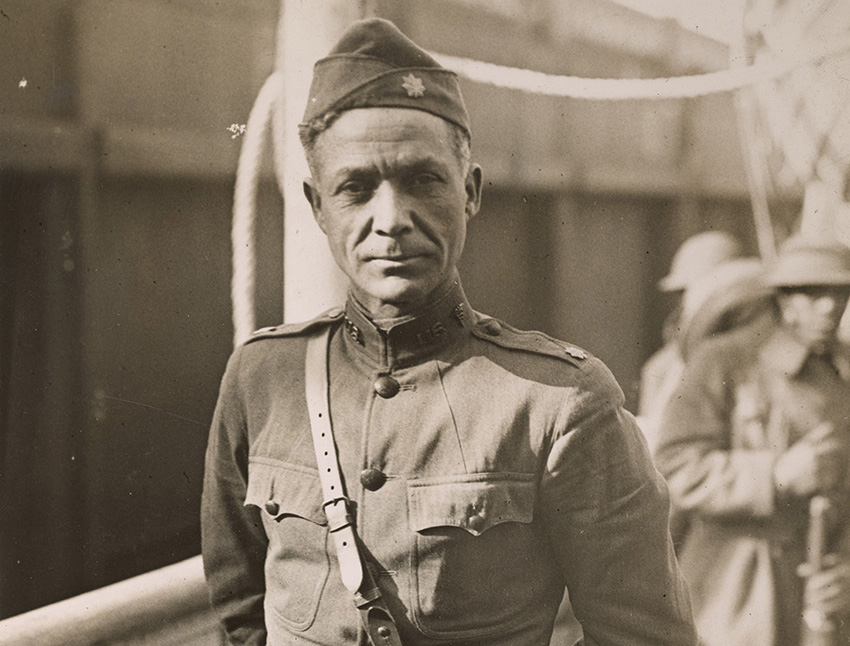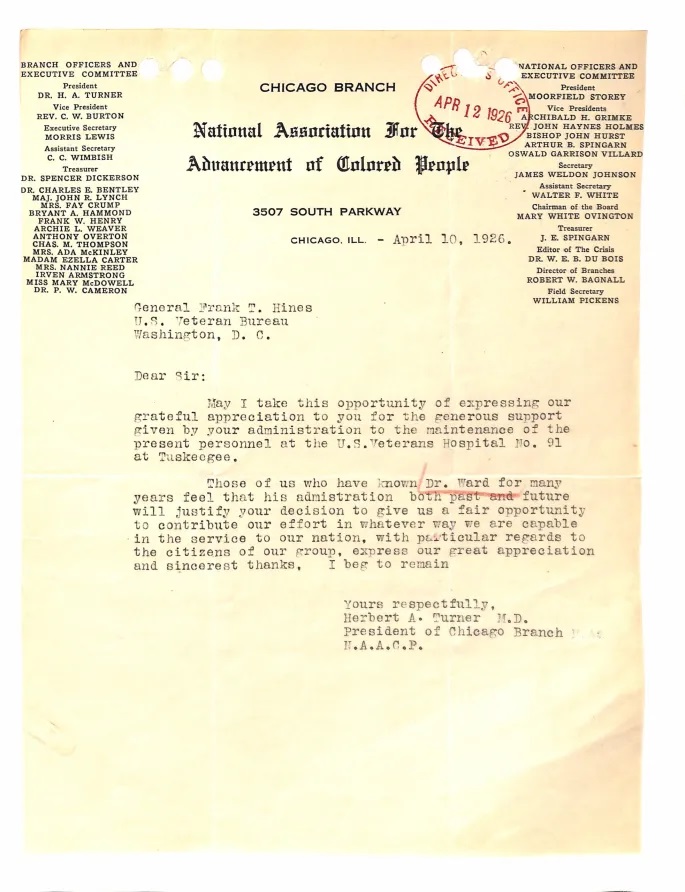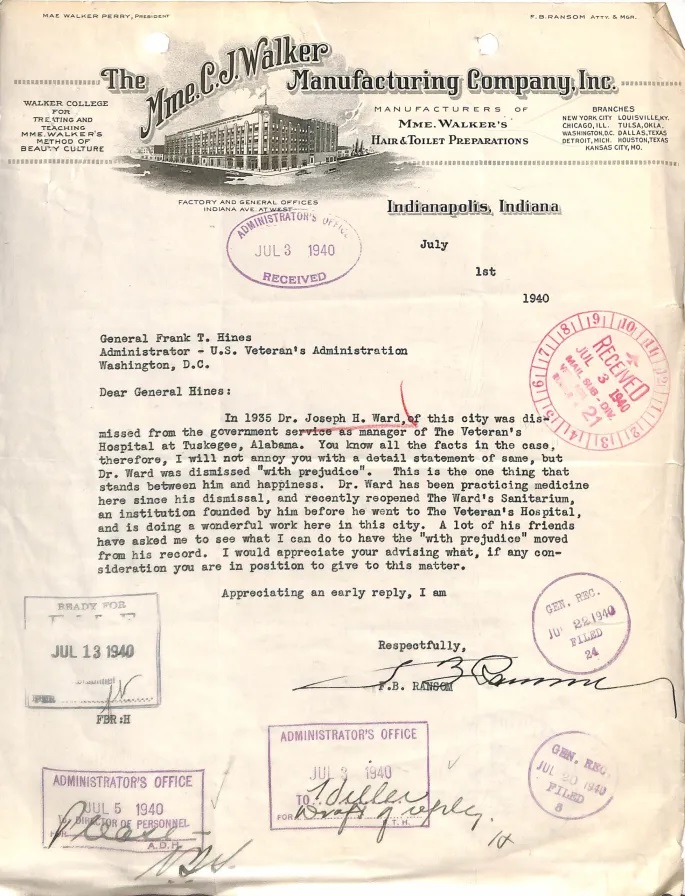
Records Help Honor Legacy of Trailblazing Black Physician
Dr. Joseph Ward Served as Director of the Tuskegee VA Hospital
By Cara Moore Lebonick | National Archives News
WASHINGTON, February 12, 2024 - The National Archives at St. Louis recently helped the Department of Veterans Affairs (VA) celebrate the 100th anniversary of Tuskegee Hospital using National Archives records and blogs to help honor the legacy of a trailblazing Black doctor who served his country and his fellow veterans.
Tuskegee is a name long associated with strife, triumph, and perseverance of the Black experience. The Tuskegee Hospital campus was the first VA facility in the nation to be administered by an all-Black medical staff, thanks to the leadership of Dr. Joseph Ward as Medical Officer following his appointment in 1924. A veteran of World War I, Ward was the only Black soldier commissioned as a major in the Medical Corps, and he worked to advocate for his community in all areas of his life.
Following his military service, Ward founded a medical school in Indiana, one of the only ones in the country to train Black women in nursing. At Tuskegee, Ward extended this advocacy by hiring a talented Black staff and ensuring they had the necessary equipment to provide care to their patients.
In 1936, Ward’s time at the hospital came to an end when he was removed “with prejudice,” as stated in his separation paperwork, from his position. The dismissal followed an investigation that concluded with 26 charges brought against Ward in a hearing, including charges of mismanaging government funds. Ward’s Official Personnel Folder (OPF) indicates a robust response from the community protesting the charges and dismissal. Citizens not only cited the known racial prejudice of the individual bringing the charges, but also his conflict of interest, as the accuser was involved with government contracts for the hospital. This probable source of conflict and racial prejudice is what sparked the suspicion that Ward’s dismissal may have been unjust. Part of this year’s 100th-anniversary celebration included posthumous honors for Ward in an attempt to correct this wrong.
In the course of their research for the anniversary, the VA became aware of a blog post by David Hardin, an archivist at the National Archives at St. Louis. Hardin had researched Ward’s work and digitized his personnel file before publishing the story on the National Archives’ Rediscovering Black History blog.
“His story reminded me of some of the best movies, plays, or books that I have ever seen or read,” Hardin said. “The personnel file was laid out like a great drama. Ward accepts a historic role and is accomplishing much, and then all is interrupted by terrible events and suffering. Just as he was rising greater onward, the sting of racism and prejudice cut his ascent. His story is America, played out over hundreds of pages in a personnel file.”
When Secretary of Veterans Affairs Denis McDonough learned about Dr. Ward’s story, he asked his Assistant Secretary, Office of Human Resources and Administration/Operations Security and Preparedness to research Ward’s case and determine what action could be taken to honor Dr. Ward’s great legacy. Together with tireless research efforts of VA employees, they marshaled resources to gather additional historical information about Ward’s case.
At the National Archives at St. Louis, the VA obtained Ward’s entire OPF, which contained records of his trial, the charges brought against him, and the explanation and decision for each of the charges. They were able to use these primary documents to determine if there was just cause for his firing more than 90 years after the fact.
As the VA proceeded with the investigation, they did not appear to have preconceived notions about whether Ward’s firing was justified, in Hardin’s interpretation of their requests. In remarks made in connection with the 100-year anniversary, Secretary McDonough stated that “some modern historians believe [the charges] had no tangible evidence and were potentially promoted by a handful of disgruntled members of the Tuskegee community.”
“We cannot re-write history,” McDonough continued. “We cannot undo the harm that was done to Dr. Ward, or his brave staff, or the millions of Black Americans who have served our country in uniform—who have fought for equal rights for all Americans—for all of us who gather here today. But we can, and we must, do what we know to be right in this moment.”
During the celebration of the history and legacy of the Tuskegee VA Hospital in September 2023, Secretary McDonough announced two ways the VA would honor Ward. In partnership with the Heart of Alabama Food Bank, they opened the Dr. Joseph Henry Ward Veterans Food Pantry, and the VA posthumously recognized Dr. Ward with the Secretary’s Exceptional Service Award. The award was placed on display at the Tuskegee VA Campus Museum in honor of Ward’s trailblazing service as a federal employee and military service member.
A VA archivist wrote an email to Hardin, praising him for his work and the impact that it had in helping to set the historical record straight.
“Your work helped the VA recognize exactly what wrong was done and, while we can’t correct what happened in 1924, we can take action to correct the record,” she said. “Your article let people who do not do history for a living understand what happened and make a plan to formally apologize. Most importantly, the article allowed Dr. Ward to become a person in a way that a briefing packet could never have done. It’s not every day that happens in the government, and your work directly impacted it. Thank you for that.”


